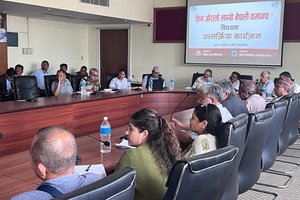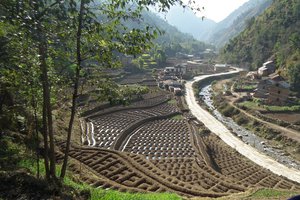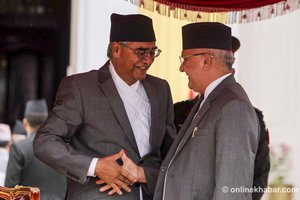
VOL. 16, No. 21, June.30,2023 (Ashad,15. 2080) Publisher and Editor: Keshab Prasad Poudel Online Register Number: DOI 584/074-75
Published on: Jun 30, 2023
Articles

Controversial Constituency Development Fund in Nepal: Public Concerns
The implementation of the CDF in several South Asian and African developing countries has yielded unfavorable outcomes. These initiatives have been associated with negative impacts on accountability and service delivery.
By Dr.Prabin Manandhar | Jun 18, 2023

Industrialization From the Ground Up:Small Farmers Could Be the Catalyst
Needless to mention, Nepal is richly endowed with agro-bio diversity and different types of eco-systemsfrom tropical, temperate up to the alpine in a short distance can be observed besides having adequate land and water prerequisitefor agriculture.
By Shivaram Pd. Koirala, PhD | Jun 19, 2023

Questioning Philosophy Anew Across Civilizations
Both the Chinese and the Indian assertions, as well as currently African and South-East Asian as the boundary fault line of Indic and Sinic civilizations, are bound to play a greater role in governance debates in the years ahead.
By Dipak Gyawali | Jun 21, 2023

BEEN: For Energy Efficient Building Policy
Despite the possibility of facing a severe energy crisis in the upcoming anticipated rise in the home energy use for heating and cooling, Nepal still lacks a strong policy for energy-efficient construction. Building Energy Efficiency in Nepal (BEEN), funded by the European Union under SWITCH -Asia and started a year ago, is currently being implemented by the University of Innsbruck in partnership with MinErgy Pvt. Ltd in Nepal, Greentech Knowledge Solutions Pvt. Ltd in India, and Association Espaola de Normalization (UNE) in Spain. This project is also assisting national and sub-national governments in developing energy-efficient building policies
By Keshab Poudel | Jun 23, 2023

LIRIC: Climate Change Impact Reduction
The Local Initiative to Reduce the Impact of Climate Change (LIRIC) has shown how Nepal's development partners, local non-governmental organizations (NGOs), communities, and elected local governments can collaborate to build a climate-resilient community and reduce the effects of climate change. The LIRIC Project, funded by the European Union and Austrian Development Cooperation, Adventist Development and Relief Agency (ADRA Austria), and implemented by ADRA Nepal in collaboration and close coordination with Rupantaran, Community Development and Advocacy Forum (CDAFN) Bardibas, local communities, and locally elected governments, has built resilient communities by launching various programs and schemes such climate field schools, community based adaptation plans, payment for ecosystem services, school climate change education, third party financing, integrated water systems including pond conservation, seepage water harvesting system, water source conservation, and local community development. With capacity strengthening of Civil Society’s Organizations (CSOs) and developing their networks, the project has worked towards making the local governments and stakeholders accountable for their actions as well as supporting vulnerable communities towards mitigation and adaptation interventions. Because Nepal is particularly vulnerable to climate change, many of the LIRIC project's beneficial lessons can be repeated in other places to lessen the impact.
By Keshab Poudel | Jun 29, 2023

KUL MAN GHISING: Fight Alone for the Light
The majority of Kul Man Ghising's weekends are spent inspecting construction sites and resolving disputes throughout the nation as the managing director of the Nepal Electricity Authority (NEA). In order to remove obstacles, including the clearing of the forest, MD Ghising spends his six days in the office completing official business and visiting various ministries and departments. In order to offer uninterrupted electricity, MD Ghising has been running from location to location to preserve the quality of the electricity. He is waging a lone struggle to improve Nepal power system
By Keshab Poudel | Jun 30, 2023
Latest Updates
- Gelephu Roadshow 2025: Connecting India and Bhutan for Sustainable Development
- 9 hours, 43 minutes ago
- Embassy of Nepal in India and PHDCCI India-Nepal Centre Organised “India-Nepal Economic Cooperation Meet 2025
- 4 days, 10 hours ago
- Bhanu Jayanti being celebrated today
- 5 days, 20 hours ago
- Police Interrogate Two Monarchist Officials, Release Them After Written Commitments
- 6 days, 20 hours ago
- Spain’s Academia de la Diplomacia and Nepal’s The Diplomat Nepal Join Hands
- 1 week, 1 day ago
- Just being born in Nepal does not make one a Nepali: former King Gyanendra Shah
- 1 week, 4 days ago
- Siddhababa Tunnel Makes A Major Milestone
- 1 week, 5 days ago
- PM Oli Returns Home Attending UN FFD4 Summit
- 1 week, 6 days ago
- Journalist Pathak ordered to be released on bail of Rs 25,000
- 2 weeks ago
- Tik Talker Rama Basnet released on bail of Rs 30,000
- 3 weeks, 1 day ago



